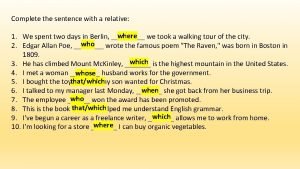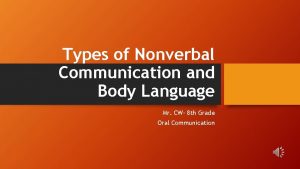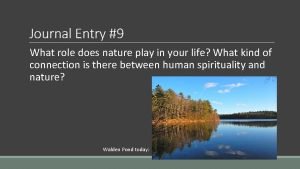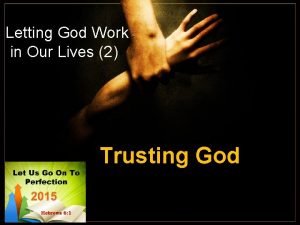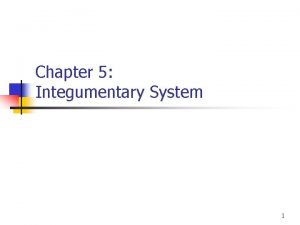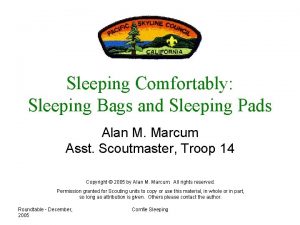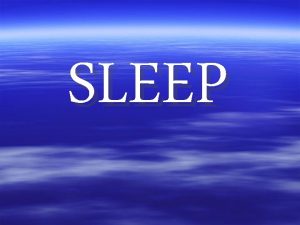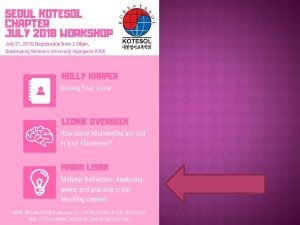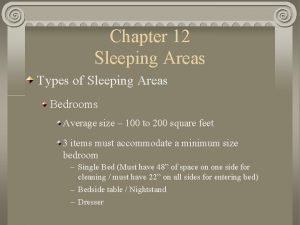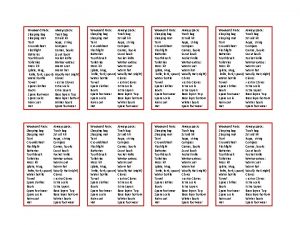Sleeping 13 of our lives are spent sleeping








- Slides: 8

Sleeping… ü 1/3 of our lives are spent sleeping… üThe record for the longest period without sleep is 18 days, 21 hours, 40 minutes during a rocking chair marathon. The record holder reported hallucinations, paranoia, blurred vision, slurred speech and memory and concentration lapses. üA new baby typically results in 400 to 750 hours lost sleep for parents in the first year. üAs a group, 18 to 24 year-olds deprived of sleep suffer more from impaired performance than older adults…Experts say one of the most alluring sleep distractions is the 24 -hour accessibility of the internet. üThe extra-hour of sleep received when clocks are put back at the start of daylight in Canada has been found to coincide with a fall in the number of road accidents

Why is sleep so important? üRevive the tired body üBuild resistance to infections üHelp recover from stress üStore information from the day Primitive Hibernation…conserve energy Adaptive Process…stay out of harms way To clear minds of useless information

Is sleep emotional…or biological? ? ? Are you a morning person? ? ? . . . when do you feel the most alert? Circadian Rhythm… “ A biological clock that is genetically programmed to regulate physiological responses within a time period of 24 -25 hours” üAssists in the 24 hour sleep-wake cycle, even absent environmental cues üChanges the body…temp, blood pressure, brain waves, heart beat, appetite. etc… üJet Lag: for every hour difference, takes one day to reset!

Brain Waves As our brain waves change, so too do our states of consciousness. Beta – Awake and Alert Alpha – Relaxed and drowsy Theta – Light Sleep, REM Sleep Delta – Deep Sleep

SLEEP SLEEP There are FIVE stages of sleep… Stage 1: Hypnagogic and Light Sleep Relaxed State / Light Sleep Many experience sudden muscle contractions preceded by a sensation of falling. Alpha to Theta Brain Waves If woke up, you’d say you were “Drifting” Stages 2 -4: Light to Deep Sleep Stage 5: REM Sleep Theta to Delta Brain Waves Stage 4 = most difficult to awaken Stage 4 = Deepest sleep, Delta waves Rapid-Eye Movements Theta Brain Waves Face and fingers twitch, but Large muscle groups paralyzed… Most interesting and vivid dreams

The Sleep Cycle… Stage 5 -REM SLEEP: One complete cycle lasts approximately 90 -100 minutes Stage 2 - Average sleep period = 4 -5 rotations Stage 4 - Stage 3 -

Narcolepsy Sleep Apnea Symptoms: Causes: Sleep Disorders Insomnia Nightmares/ Night terrors Sleepwalking/ Sleep talking Symptoms: Causes:

Sleep Disorders Insomnia Nightmares/ Narcolepsy Sleep Apnea Symptoms: • Overwhelming feeling of sleepiness/ fatigue • “sleep attacks” can last from several seconds 30+ minutes Symptoms: Trouble breathing during sleep Symptoms: Failure to Sleep Causes: • Unknown • Heredity • Can be brought about by brain damage or neurological disease Causes: • Snoring • Enlarged Tonsils • Obesity • Recurring infections Causes: • Anxiety • Depression • Alcohol Abuse • Drug Abuse • tends to increase with age • 40% women and 30% men • Illness Night terrors Sleepwalking/ Sleep talking Symptoms: Screaming Panic Symptoms: • Mostly found in children Walking/ talking while asleep Causes: REM Sleep Causes: • Immature nervous system • Stress • Fatigue • Heredity
 Mikael ferm
Mikael ferm We spend our holiday in scotland last year
We spend our holiday in scotland last year An old man was fishing next to me was muttering to himself
An old man was fishing next to me was muttering to himself Eye contact is woven into the fabric of our daily lives.
Eye contact is woven into the fabric of our daily lives. Mass media play an important part in our lives
Mass media play an important part in our lives Journal entry
Journal entry God's work in our lives
God's work in our lives Drawing the power of jesus christ
Drawing the power of jesus christ During our lives we produce three kinds of hair
During our lives we produce three kinds of hair

